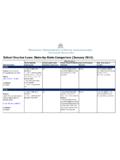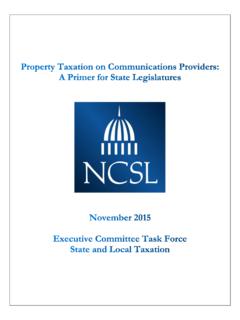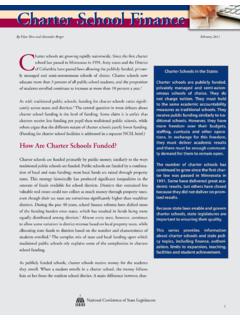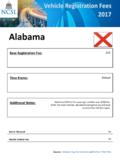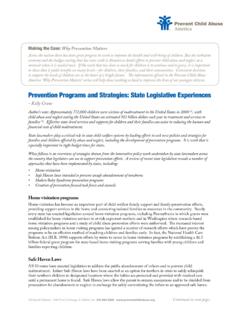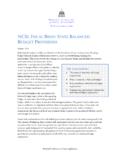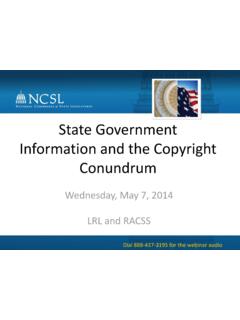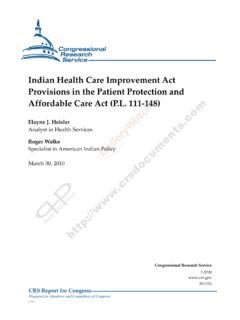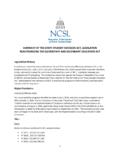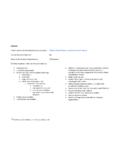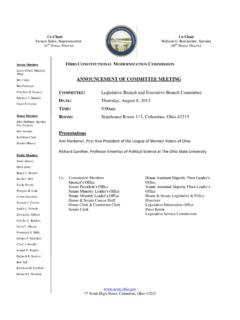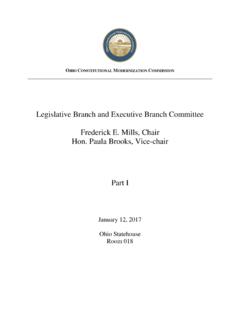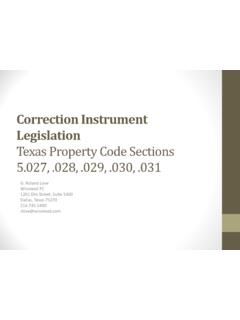Transcription of Prohibiting PBM “Gag Clauses” that Restrict …
1 7700 E. 1st Place, Denver, CO 80230 direct (303) 856-1367 Prohibiting PBM Gag Clauses that Restrict Pharmacists from Disclosing Price Options: Recent State Legislation 2016-2018 July 23, 2018 Compiled by the ncsl Health Program, Richard Cauchi, Program Director Pharmacy-based and mail-order consumer purchases of prescription drugs were a $235 billion market annually in the United States in 2015. Commercial contracts between a pharmacy and a Pharmaceutical Benefit Manager (PBM) are a widespread feature in the distribution and sales chain between original manufacturer and the end consumer. However, the terms of these arrangements and binding contracts usually are invisible to individual consumers and some purchasers such as employers. In some cases, these arrangements include restrictions that mean a pharmacist is prohibited by a contract with a PBM from informing consumers that the drug they want to buy has purchase options, and could be purchased at a lower cost if the consumers paid out of pocket rather than purchasing through their insurance plan.
2 In financial terms, prescription drug overpayments (also known as co-pay clawbacks ) also occur when commercially insured patients copayments exceed the total cost of the drug to their insurer or pharmacy benefit manager. These so-called gag clauses have come to the attention of state policymakers seeking to lower drug costs, by requiring more extensive transparency at the retail pharmacy level. A rapidly growing number of legislative proposals in 2018 seek to block such commercial PBM or health insurer contracts that may prohibit pharmacies from informing customers about available alternative pricing for medications, including paying out-of-pocket, or including generics or brand products that may be less costly, or comparatively more suitable for a patient. Many bills also address the "co-pay clawback situation noted above.
3 RELATED TOPICS Generic Drug Pricing and States: $4 drug promotions - posted July 25, 2018 ncsl report on the history and evolution of extra-low-priced products, spurred by commercial competition among supermarkets and big box retailers and a few pharmacy chains, updated to 2012. Pharmacy Audit Standards - Enacted Legislation - Audits of pharmacies by pharmacy benefit managers (PBMs) are a common practice to help identify and mitigate fraud, waste and abuse of a prescription drug benefit. Pharmacists have begun to push back on these inspections citing unfair auditing practices which can result in stiff penalties and fees. In response, over the past few years several legislative measures, often referred to as the Fair Pharmacy Audit Act or Pharmacy Audit Bill of Rights, have been enacted in 38 states Statute Example Gag Clause: North Carolina s enacted Chapter 2017-116 provides: ''A pharmacy or pharmacist shall have the right to provide an insured information regarding the amount of the insured's cost share for a prescription drug.
4 Neither a pharmacy nor a pharmacist shall be penalized by a pharmacy benefits manager for discussing any information described in this section or for selling a lower priced drug to the insured if one is available.'' Between 2016 and July 23, 2018, at least 22 states enacted laws among at least 40 state legislatures that considered Prohibiting gag clauses in contracts that Restrict pharmacists. The most recent laws, signed in March -June 2018, include Arizona, Colorado, Florida, Indiana, Kansas, Kentucky, Mississippi, New Hampshire, Utah, Virginia and West Virginia. Alaska (2 filed bills 2018; H 240 passed Senate and House; pending) Arizona (H 2107; enacted law, 2018) Arkansas (H 1010; enacted law, 2018, 2015)3 California (2 filed bill 2018) Colorado (H 1284; enacted law, 2018) Connecticut (enacted law, 2017) Delaware (filed bill, H 425; passed House and Senate 2018, pending) NEW-6/30/2018) Florida (H 351; enacted law, 2018) 3 Georgia (2 enacted laws, 2017) Hawaii (filed bill 2018; passed Senate and House; failed in Conference Committee) Idaho (PBM transparency bill filed; failed 2018) Indiana (2 bills filled 2018; H 1317, enacted law, 2018) 3) Kansas (enacted law, 2018) Kentucky (enacted law, 2018) 3 Louisiana (enacted law, 2016; 3 filed bills 2018: SB 241 enacted law)3 Maine (enacted law, 2017) Maryland (2007 and 2018 enacted laws.
5 S 576) 3 Michigan (filed bill 2018; pending) 3 NEW Minnesota (filed bill 2018; passed House, Failed-Adjourned; previously enacted law)3 Mississippi (limited enacted law, 2016; expanded application, enacted law, 2018) Missouri (filed bill 2018; passed House; pending) Nebraska (filed bill 2018; pending) Nevada (S 539; enacted law, 2017)3 New Hampshire (H 1791; enacted law, 2018) 3 NEW New Jersey (5 filed bills 2018; pending) New York (4 filed bills 2018; Passed Assembly to governor; pending) North Carolina (enacted law, 2017). North Dakota (enacted law, 2017) Ohio (filed bill 2018; pending)3 Pennsylvania (filed bill 2018; pending) Rhode Island (filed bill 2018; pending-held) South Carolina (H 5038; enacted law, 2018) South Dakota (Filed bill; enacted law signed 2018 session) Texas (enacted law, 20173 Utah (S 208; enacted law, 2018) 3 Vermont (S 92; passed House and Senate; enacted law, 2018) 3 Virginia (filed bill 2018; passed House and Senate; enacted law, 2018) Washington (2 filed bills 2018; 1 passed House; failed- adjourned) West Virginia (2 filed bills 2018; S 46 enacted law, 2018) 3 Wisconsin (2 filed bills 2018; failed)3 Wyoming (filed bill 2018.)
6 Failed) The ncsl Insurance Task Force on May 11, 2018 held a special session focused on Pharmacy Costs and PBMs, with new slides and speakers, in Denver o Pharmacy Costs PBMs- ncsl Presentation by Richard Cauchi, Program Director, ncsl o Pharmacy Costs PBMs-NCPA Presentation by Matthew Magner, National Community Pharmacists Association o PBMs-AHIP Presentation by Sara Orange, America's Health Insurance Plans o Pharmacy Costs PBMs-PCMA Presentation by Lauren Rowley, Pharmacy Care Management Association o North Dakota State Representative George Keiser, co-chair of the Insurance Task Force, described how pharmacy benefit managers weren t disclosing price options to the customer, but they were disclosing it to me and other legislators. They argued, We have to have formularies, we have to be able to control them, that s how we manage costs, he said, describing lists of covered drugs and prices.
7 But, Keiser said, compared with the examples of cheaper prices it was clear that was not in the best interests of the consumer. The Trump Administration, also on May 11, 2018, announced a "Blueprint to Lower Prices and Reduce Out-of-Pocket Costs" presenting more than 25 elements including Incentives for Lower List Prices and Lower out-of-pocket Costs," and restricting "gag clauses," for future federal action. - [Read: Fact Sheet | Blueprint Report, 41 pp] As part of President Trump s blueprint to lower drug prices, "CMS is warning Medicare Part D Prescription Drug Plans (PDPs) that so-called gag clauses aren t allowed and that their network pharmacies must disclose when the Part D plan price or copay of a drug is more than the cash price. Yet analysts say it s likely to affect a small percentage" (5%) of PDPs. That translates to some million beneficiaries.
8 (article from AIS, 6/13/18) CMS Administrator Seema Verma, wrote on May 17, 2018, Many patients don t know that some drugs are actually more expensive when they use their insurance. What s worse is that some pharmacy benefits managers are preventing pharmacists from telling patients when this is happening, because they get a share of the transaction when the patient uses their insurance. Today we are taking a significant step towards bringing full transparency to all the back-end deals that are being made at the expense of patients. Related Media Coverage "Why Your Pharmacist Can't Tell You That $20 Prescription Could Cost Only $8" (cites ncsl data) published by the New York Times, 2/25/2018. Walmart drug program cheaper for many Medicare patients. - NBC-TV News article The discount retailer's $4 generic prescriptions beat Medicare's co-pays 21 percent of the time, a study found.
9 "It s more evidence that patients cannot always rely on their health insurance to get them the lowest prices for their prescription drugs, said Dr. Joseph Ross of the Yale School of Medicine, who led the study. Patients were paying more out of pocket when they were using their insurance than when they went to Walmart, Ross said. We did this study in part because of all the discussion about pharmacy gag rules. The study published in the Annals of Internal Medicine. ( ncsl data cited), NBC-TV News article by Maggie Fox / July 23, 2018. Overpaying for Prescription Drugs: A White Paper - The Co-pay Clawback Phenomenon; an academic report by USC Schaeffer Center, California, 3/2018 (11 pp, PDF) The 'gag clause'- There might be a cheaper drug, but pharmacists can't tell you that. ( ncsl quoted) Idaho News Tribune News Service, 7/1/2018 There Might Be a Cheaper Drug, But Pharmacists Can t Tell You That - ( ncsl report cited) Stateline, 5/30/2018 Ohio pharmacists must reveal cheaper drug options after 'gag order' removed.
10 "Fill a prescription at a pharmacy, and you might not pay the lowest price available." ncsl research USA TODAY., 4/5/2018 Ohio takes another step toward PBM transparency. An Ohio House committee on May 22 recommended passage of HB 479, which would crack down on PBM opacity by banning gag rules that stop pharmacists from telling their customers about cheaper options for obtaining their medicines. And that s a step in the right direction. The Columbus Dispatch, 5/22/2018. Prescription Drug Break Down (Video ') The Columbus Dispatch, 5/22/2018. Independent Druggists Say They Lose Money on Many Rx Sales - BNA Health Care at Bloomberg Law, 2/26/2018. Patients Overpay For Prescriptions 23% Of The Time, Analysis Shows - ( ncsl report cited) Kaiser Health News, 3/13/2018 | Business section, Los Angeles Times 3/14/2018.
